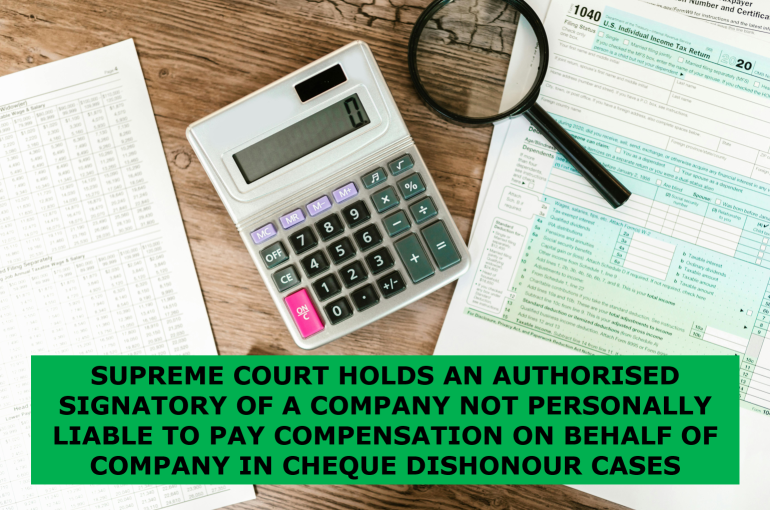SUPREME COURT HOLDS AN AUTHORISED SIGNATORY OF A COMPANY NOT PERSONALLY LIABLE TO PAY COMPENSATION ON BEHALF OF COMPANY IN CHEQUE DISHONOUR CASES
A two Judge Bench of Supreme Court comprising of Justice Vikram Nath and Justice Prashant Kumar Mishra passed a judgement dated 24.07.2024 in the matter of Shri Gurudatta Sugars Marketing Pvt. Ltd. vs. Prithviraj Sayajirao Deshmukh & Ors. SLP (Crl.) Nos. 8849-8850 of 2023 wherein the Apex Court held that an ‘authorised signatory’ of a company cannot be treated as a ‘drawer’ of cheques and thus, cannot be held liable to pay interim compensation on behalf of the company, in cases pertaining to dishonor of cheques.
Facts
The Company – Shri Gurudatta Sugars Marketing Pvt. Ltd (Appellant Company) and Cane Agro Energy (India) Ltd. (Cane) entered into several Agreements and Sale Orders between September 2016 and June 2017. As per the Agreements and Sale Orders, the Appellant made advance payments amounting to Rs. 63,46,00,000/- (Rupees Sixty-Three Crores Forty-Six Lakhs only) to Cane for supply of sugar.
However, Cane failed to fulfill the Sale Orders and discharge its obligations towards the Appellant Company. Thus, Cane refunded Rs. 1 Crore to the Appellant Company on 30.01.2018 and subsequently it issued Cheques amounting to Rs. 45,00,00,000/- (Rupees Forty-Five Crores only) and Rs.6,64,41,300/- (Rupees Six Crores Sixty-Four Lakhs Forty-One Thousand and Three Hundred only). These Cheques were signed by the Respondent No.1, who is the Chairman of Cane Agro Energy (India) Ltd.
Thereafter, the Cheques were dishonored due to insufficiency of funds and the Appellant issued Notice to the Respondent Nos. 1 to 3 requesting for payment of dues. On non-payment of dues, the Appellant filed a summary Criminal Case No. 2967 of 2020 before Ld. Judicial Magistrate in Kolhapur.
The Appellants also filed an Application under Section 143-A of the Negotiable Instruments Act 1881 (N.I Act) (Power to direct interim compensation) requesting the Court to provide interim compensation from the Respondents during the pendency of the proceedings. The Judicial Magistrate granted interim compensation of 4% of the total Cheque amount to the Appellant, vide Order dated 27.04.2022. The Execution proceedings for the Order dated 27.04.2022 are still pending before Ld. Judicial Magistrate.
Proceedings before the Bombay High Court
The Respondents 1-3 filed a Writ Petition in the Bombay High Court on the question that whether a signatory of a cheque, who is authorised to sign on behalf of a company, will be considered as a ‘drawer’ of the cheque and as such will be liable to pay interim compensation. The Respondents also filed a Criminal Application challenging the aforesaid Order dated 27.04.2022. The High Court, vide Order dated 23.09.2022, provided a stay on the Interim Order dated 27.04.2022 passed by the Judicial Magistrate. Moreover, the High Court, vide Order dated 08.03.2023, held that a ‘signatory’ of a cheque is not a ‘drawer’ as per Section 143-A of NI Act and thus he cannot be held liable to pay the interim compensation. The Hon’ble Court provided that an ‘Authorised Signatory’ cannot be equated to a ‘Company’.
Thus, aggrieved by the decision of the Bombay High Court, the Appellant Company challenged the Bombay High Court Orders dated 23.09.2022 and 08.03.2023 in the Apex Court in SLP (Crl.) Nos. 8849-8850 of 2023.
Issues
1) Whether a ‘signatory’ of a cheque is the same as a ‘drawer’ of the cheque as per the NI Act?
2) Whether such ‘signatory’ could be directed to pay interim compensation under Section 143-A of the NI Act?
Decision by the Apex Court
The Apex Court interpreted Section 7 of the NI Act, which explains the term ‘Drawer’ as the individual who issues the cheque and he must ensure that there are sufficient funds in the bank account while issuing cheques. However, the Apex Court observed that by looking at the Appellant’s arguments that directors and individuals acting in the signatory capacity must be held liable for interim compensation is not justifiable. The Hon’ble Court emphasized on the distinction between the corporate legal entities and the individuals acting as authorised signatories.
The Apex Court held that authorised signatories can act on the behalf of the company but they do not take over the company’s legal identity and thus the Hon’ble Bench supported the distinction provided by the Bombay High Court between the Authorised Signatories and the Company.
The Hon’ble Supreme Court relied on the judgement of N. Harihara Krishnan v. J. Thomas (2018) 13 SCC 663 wherein it was held that a ‘signatory’ merely signs a document on behalf of a company and does not become a ‘drawer’ as per the NI Act.
The Apex Court also held that the primary liability under Section 138 NI Act (Dishonour of Cheque for insufficiency, etc., of funds in the account) lies with the company and the management of the company can be held vicariously liable under Section 141 of NI Act (Offences by companies). Thus, the Hon’ble Supreme Court aligned with the interpretation of the High Court and held that a ‘drawer’ is strictly seen as the issuer of the cheque but excludes ‘authorised signatories’ and thus upheld the High Court Order in WP-201-2022 and WP-1250-2022 and hereby, held that the Respondent No. 1 is only an Authorised Signatory of the Company- Cane and hence, not liable to pay interim compensation to the Appellant under Section 143-A of NI Act.
Conclusion
The Hon’ble Supreme Court closely interpreted the difference between the liabilities of an ‘authorised signatory’ who is merely authorised to sign documents on the behalf of a company which is the actual ‘drawer’. The Apex Court by dismissing the Appeal and Applications filed by the Appellant Company, held that any authorised signatory or director of a company cannot be held liable to pay interim compensation as per Section 143-A of the NI Act.
ARJAV JAIN
ASSOCIATE
THE INDIAN LAWYER & ALLIED SERVICES





































Leave a Reply